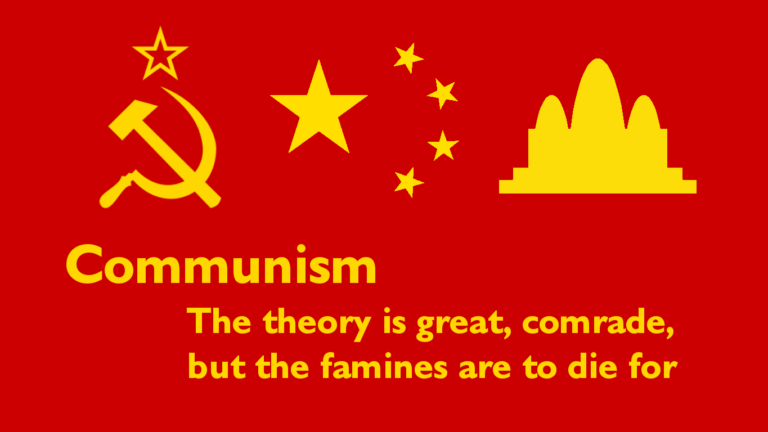Somewhere on the book of feces I encountered comments that could be summed up by “Communism wasn’t that bad and the US is worse for those people at the bottom than communism was”. There was also mention of how under communism everyone had a job and housing was free.
Since I actually visited the Soviet Union four times in the late 1980s/early 1990s, helped host some Soviet students for a few days in the UK, and also visited other Eastern Bloc countries in 1990, I figure I should probably write down my experiences of how bad communism actually was in the hope that people who weren’t alive 30 years ago can learn from what I saw. Note that this was after the Communists had mostly stopped show trials and gulags and had begun looking at reforms to try and improve things.
To start with an overall comment: you have no idea how shockingly poor it was despite “employment for all and housing for all”. Not just poor but run down and, in some cases, literally crumbling. There were rusted wrecked bits of stuff all over the place. Wrecked vehicles, girders that had once supported some kind of building, bits of pipe from small to storm sewer sized and so on. The roads made the potholed horrors of New Orleans or Detroit look good.
First housing. I saw/stayed in a flat in Moscow, a village house in some village near Yaroslavl and I stayed also in hotels in Leningrad and Moscow.
In the Moscow flat the shower didn’t work. And had never worked for years. The occupant could not get it fixed by the city and could not fix it himself (literally could not locate all the required bits of piping and connectors, not even on the black market). He had a garden hose from the kitchen sink to the bathroom as his shower (and yes that meant he couldn’t shut the bathroom door). I forget if that block of flats was one of the ones with decorative tile covering the concrete walls where most of the tiles were loose if they hadn’t already fallen off, but that was common everywhere. It was a strong contrast to Helsinki were I lived for a couple of months in a block of flats that were also tile decorated but there the tiles were not falling off the walls. Also in Helsinki the shower worked, we had working modern kitchen and bathroom utilities (washing machine, stove, microwave…) etc.
Also in Moscow in 1988 I stayed in a hotel built for the 1980 Olympics (so comfortably under 10 years old). It looked OK from the outside but was unimpressive once you got in. For example, only one elevator worked for this 20-30 story hotel and the elevator shaft reeked of sewerage. From the dust on the doors, the other elevators hadn’t been in service for months if not years. That was where I got to witness the full employment though. It seemed that every floor had an official snoop. I’m not quite sure what her official function was – it certainly wasn’t to help foreign visitors – but in Leningrad, at least, her real job appeared to be to take a bribe from every whore who wanted to come up to the client’s room with him. Of which more below.
In the village the house was better but that was mostly because it had been illegally rebuilt using materials that “fell of the back of trucks”. It still was very crude compared to anything in Western Europe and it was kept warm by a wood stove because the community heating pipes were broken. You could see them at various points in the village and, again, it was obvious they hadn’t worked in years. From what I recall the house had no washing machine or fridge. The occupants were extremely proud of their record player because few if any of the other houses in the village had one and I basically paid for my stay by giving them a couple of LPs. Oh and I left a pair of jeans behind “accidentally on purpose” and swapped something (I forget what exactly but it was also incredibly low value, it may have been 5 grubby dollar bills unless that was for something else) for several bottles of Georgian champagnsky and vodka (plus the torn Afghanistan occupation force jacket of the local black market guy I was doing the deal with. I think I still have the jacket somewhere, though it is so patched my wife has forbidden me to wear it and she may have convinced me to toss it.)
Life in the village was clearly better for the average slob than life in Moscow because in the village they could (and did) grow their own veggies. OK so it was mostly cabbage and potatoes but it was fresh(ish) and helped stretch the meager salaries that urban dwellers couldn’t. In fact when I went back to Moscow (to catch the train via Leningrad to Helsinki) the car was packed with produce for my Moscow host to eat and/or use for barter for stuff. Which leads us to the state of shops.
The shops were empty. Everyone carried a string bag with them so that if they happened by chance to pass a shop that had just received a shipment of goods they could pop in and buy stuff. For the most part it didn’t matter what stuff because if it wasn’t stuff you wanted/needed you could use it to barter with someone else who wanted what you’d got and had what you wanted. All of this was technically illegal, although by the time of that last trip Glasnost and Perestroika meant that the villagers veggie patches and the market stalls and kiosks in the urban streets were actually legal as opposed to being winked at for a bribe.
There’s a famous set of pictures of Yeltsin looking amazed at the contents of a US supermarket and I can confirm that the absolute same occurred to Soviet students that I showed around the UK in December 1989. They asked questions like “why you need 5 types of beans?” and found it impossible to believe that the supermarket we went to in Cambridge was not reserved for privileged people (such as the faculty and students at prestigious universities like Cambridge). When we took them to London they were unimpressed with the Houses or Parliament (which we’d worked hard to get a tour of) but utterly blown away by the fact that we could stop on the way back on a random street in East London for a late snack and have a choice of curry, kebab or fish and chips from three different take aways near by (there may have been others as well I don’t recall). I do recall the amazement that even a chip shop had choices of half a dozen fish and that the curry house would give you beef, chicken, lamb pork or prawn curries. Oh and at the same stop we also stocked up on booze and cigarettes at the off-license corner shop across the street. To be honest the availability of booze at ~11pm surprised some of the Swedish students because at that time in Sweden all retail alcohol (except weak beer?) was sold in government monopoly shops that closed early in the evening, but it absolutely astonished the Soviets who marveled at the selection available. There were half a dozen types of vodka, more whiskies, various gins, rums etc. plus multiple brands of beer, wine from all over the world (well France, Italy, maybe Germany, and Australia) and perhaps 20 brands of cigarettes and cheap cigars. To the average Western European, Australian or North American this sort of selection was normal but it was inconceivable to a Soviet. Let’s face it a homeless bum in San Francisco can wander into a local convenience store today and face a similar selection, so in that respect a bum in San Francisco is better off today than anyone in the Soviet Union 30 years ago.
Going back to my experiences in the Soviet Union. In Leningrad the hotels were better but were not up to Motel6 standards and we were paying for a 5* hotel not a motel 6. Also in those hotels, in the lobby, were all the people who could bribe the doormen and who wanted to trade with foreigners. The trade goods on offer being anything from army uniforms to sex. You could get a complete military uniform for, IIRC, 100 Finnish marks or 30? Deutschmarks. I may have the numbers wrong it’s been 30 years and neither currency exists today but the amounts were nothing much and (allegedly) the same price or less got you a girl for a night (I didn’t test this). I think at the time there were ~2 DM or 6 Finnish marks to a US$. I recall an American with us who had brought a number of $20 bills. He found it almost impossible to spend one because $20 was too much for anything he wanted. I seem to recall he did trades with some others in the group so that his $20 bills got multiple uniforms and in return they gave him change in smaller denominations of foreign currency. It was illegal for soldiers to sell their uniforms, and illegal for foreigners to buy them and take them out of the country. The soldiers sold them because it was one way for them to get foreign currency and thus the ability to buy things they needed on the black market (see comment about shops). The border guards mostly didn’t check but, again, it was apparently known that tucking a few small denomination notes in your luggage on top of the uniforms solved those cases where the guards did feel like checking.
Oh and don’t forget the pollution. Even beyond Chernobyl there were industrial spills and the like everywhere and if you complained you’d be arrested. I recall a town we passed through on the train from Moscow to Leningrad which was gray black and shrouded in smoke/smog. There was an underground rumor mill of which towns/cities were dangerously polluted and people who got transferred to them would try to find ways to avoid moving.
I could go on for a while. I’ll just note that the Soviet Union was only medium bad in comparison to some other communist nations at the time. Romania in 1990 was an order of magnitude poorer and more polluted. The countryside was barely touched by the 20th century with most transport being donkey carts or similar. Electricity was patchy. I think I’m right that they still had steam engines on some of the rail lines (I saw the locomotives in a yard, I don’t recall seeing any in use). Most of the roads were just gravel/dirt, even some of the ones purporting to be major highways. I visited as part of a group that was giving aid (second hand clothes toys etc) to deprived areas so I got to tour an ‘orphanage’ there which was the stuff of nightmares (literally). I put the word orphanage in quotes because most of the inmates weren’t orphans, they were just the extra children that families couldn’t afford to support. Romanians had these extra children because Ceausescu had banned all forms of contraception. The conditions in the ‘orphanages’ were horrible but, although I’m sure there were a few evil people running them, most of the people were probably just trying to do what they could with no resources at all. The most disturbed children were chained to beds because that was more humane than letting them mutilate themselves. The beds (and rooms) were filthy, the children had almost no clothes, no toys and no attention from adults because there weren’t anywhere close to enough adults to do even the basic feeding and washing. People recently have protested the ‘cages’ that migrant children in the US were living in. Compared to the orphanages they were luxury hotels. My visit there was 8 months or so after Ceausescu had been overthrown and shot and people were keen to talk about the past and to make up for all the years of not daring to complain lest someone denounce them to the Securitate. The stories they told of life in the past were horrible. I met students who’d just been beaten up by miners in Bucharest a few weeks earlier and they actually said that this was better than the past. And they proudly pointed to the graffiti that named one of the plazas “Romanian Tienanmen Square” along with the bullet holes from the winter revolution.
Update: It is worth pointing out that while life was better for the privileged party elites (contrary to claims of equality by some commie true believers), compared to life in any country in Western Europe, life in the Soviet bloc was pretty limited even if you were at the top. It didn’t matter if you were Gorbachev or Yeltsin, you literally couldn’t wander down the street and go to a store with 5 varieties of beans, 20 brands of cereal, etc. There wasn’t even a warehouse anywhere in the entire country that had that variety. If you as secretary general of the communist party had a sudden hankering for, say, bran flakes or frosted fruit loops, you couldn’t even command an underling to get it for you because if they hadn’t been made this month (or imported this month) there were no bran flakes or fruit loops. Oh sure you could shoot the deputy commissar in charge of bran flakes for not getting you any but that still didn’t get you any bran flakes.
Communism was tried for quite a lot of the last century. It didn’t work anywhere and caused the death of at least 100 million people. Don’t believe the propagandists who are pushing it today














[…] My Experience of Communism […]